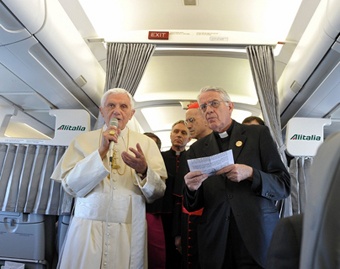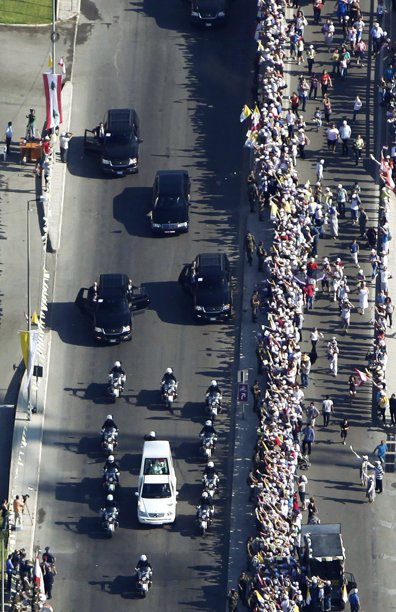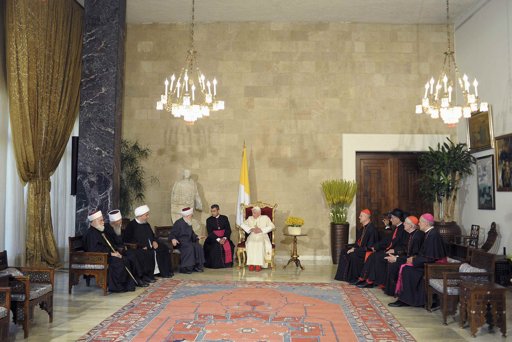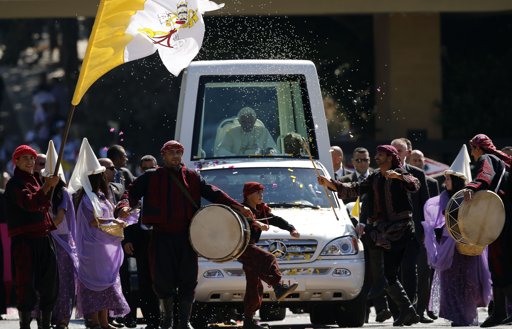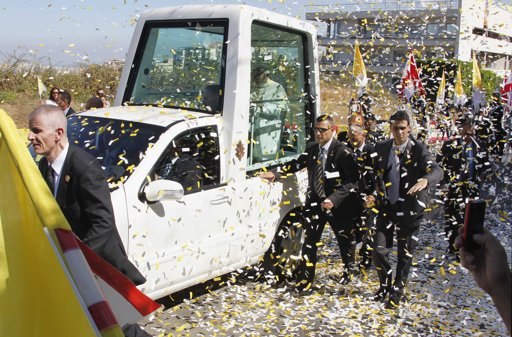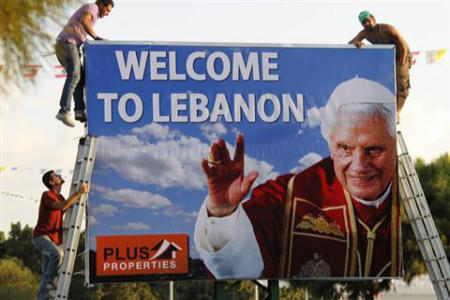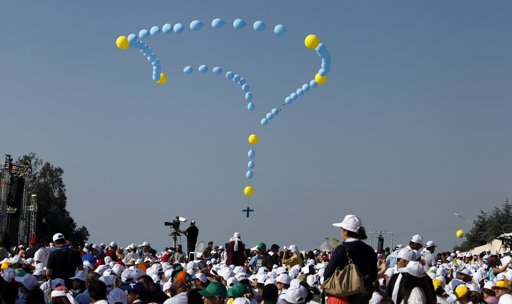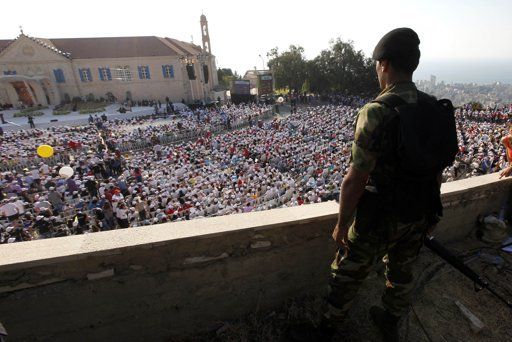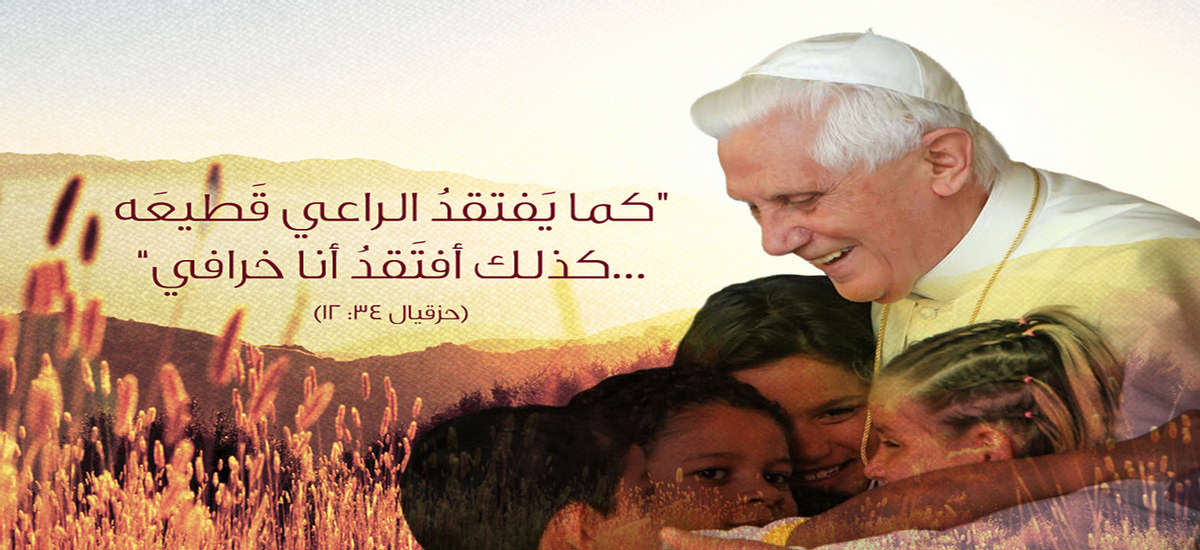
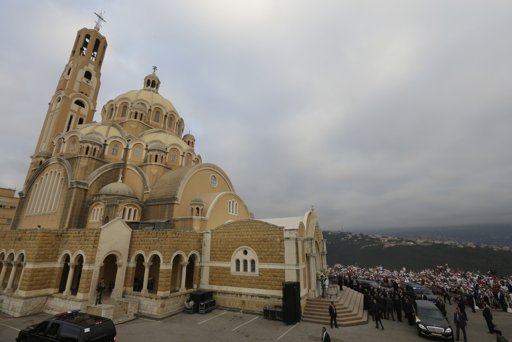
The convoy of Pope Benedict XVI, right, arrives at St. Paul’s Basilica to sign the post-Synodal Apostolic Exhortation of the special assembly for the Middle East of the Synod of Bishops, in Harissa
Pope signs momentous document on Church in the Middle East
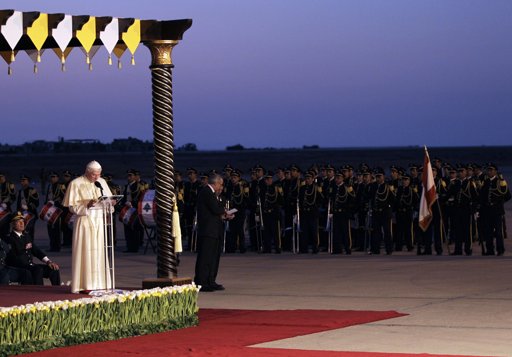
Pope Benedict XVI, left, addresses a speech in front of Lebanese honor guards during his

An aerial view of the waterfront where a mass is being held by Pope Benedict XVI in Beirut
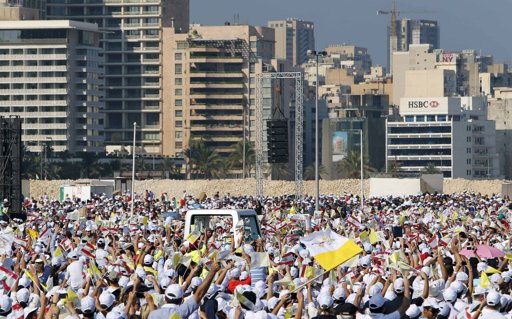
Pope Benedict waves from his Pope-mobile upon his arrival to conduct an open-air mass
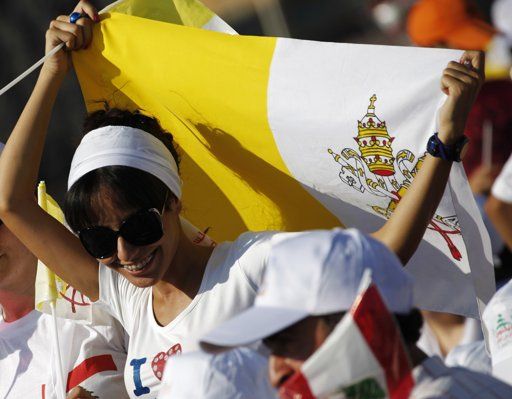
The faithful holds a Vatican flag during an open air mass conducted by Pope Benedict
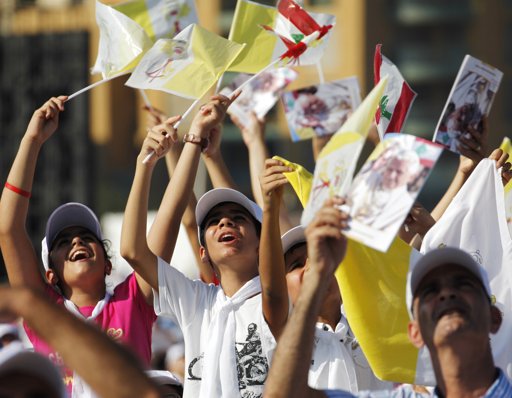
The convoy of Pope Benedict XVI proceeds towards where a mass is held in Beirut
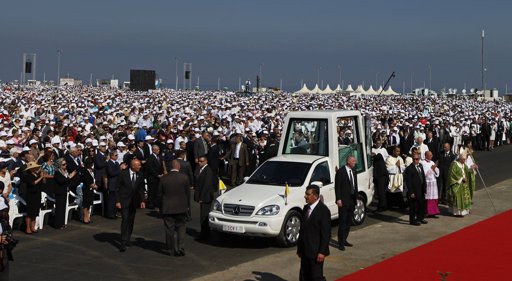
Pope Benedict disembarks from Pope-mobile to conduct an open-air mass service at Beirut
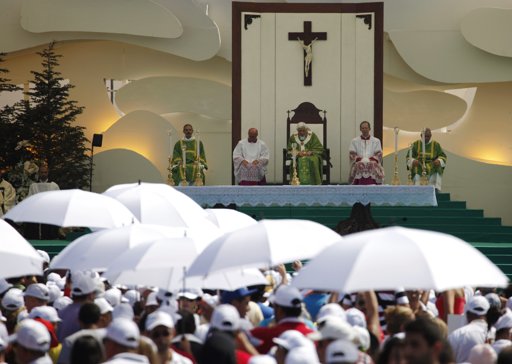
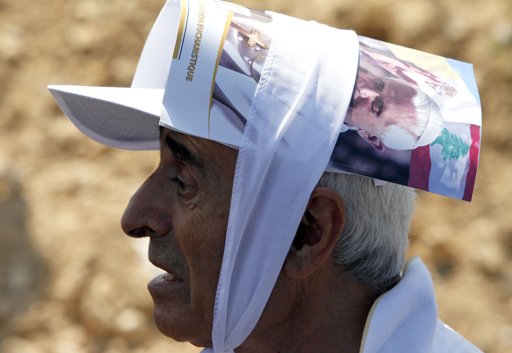
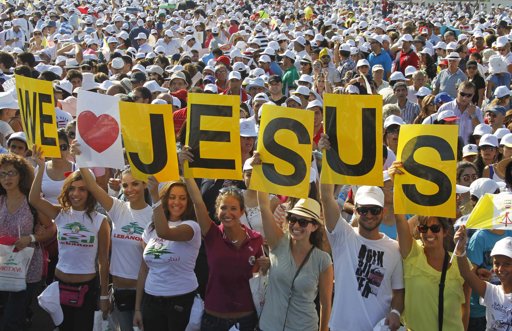
Pope Benedict XVI conducts an open air mass service as faithfuls use umbrella
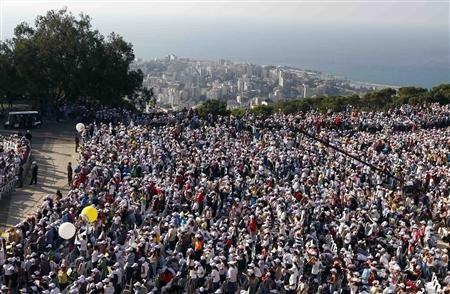
Faithful gather at Bkerke in Harissa near Beirut before the Pope Benedict XVI meets the youth September 15, 2012. REUTERS/ Stefano Rellandini
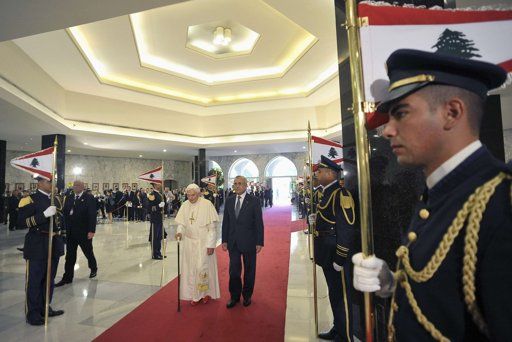
Pope Benedict XVI walks next to Lebanon’s President Suleiman as he arrives at Baabda Pres.
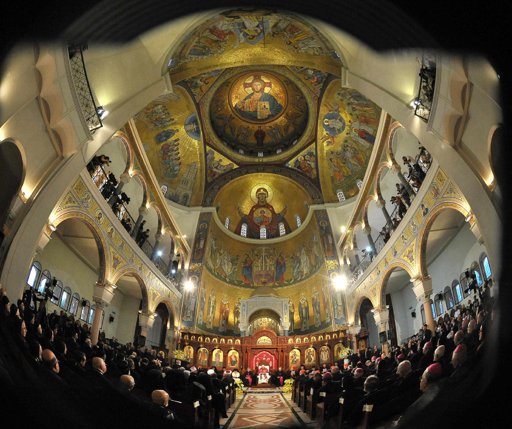
Pope Benedict XVI and Gregorios III, Patriarch of the Church of Antioch, attend a ceremon…
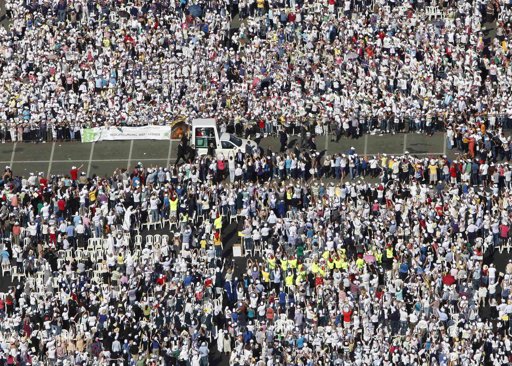
Pope Benedict XVI waves to faithfuls from his pope-mobile upon his arrival to conduct an open air mass service at Beirut City Centre Waterfront,
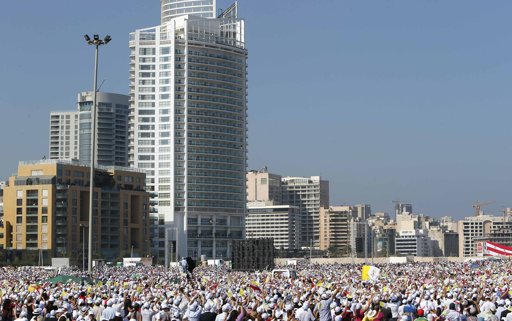
Pope Benedict XVI arrives at the waterfront of Beirut where he will lead a mass
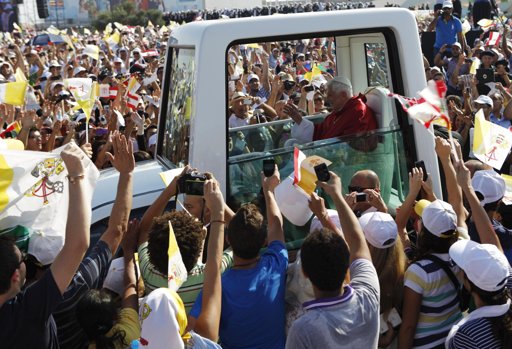
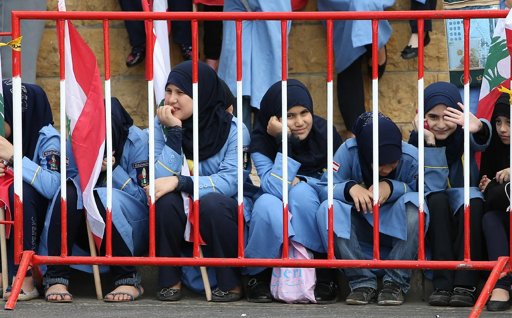
Hezbollah Al-Mahdi girl-scouts wait outside Rafik Hariri international airport to welcome the Pope Benedict XVI, in Beirut
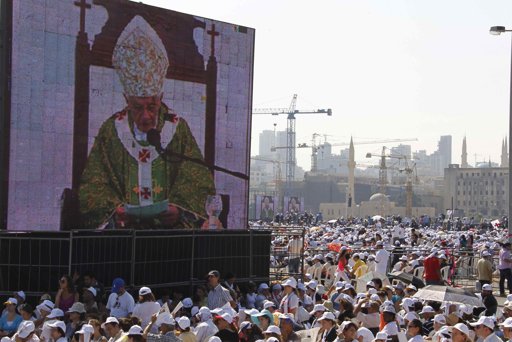
Pope Benedict conducts an open air mass at Beirut City Centre Waterfront
Pope Benedict XVI has signed his Post-Synodal Apostolic Exhortation on the Church in the Middle East, “Ecclesia in Medio Oriente,” during the first day of his visit to Lebanon. “The Exhortation as a whole is meant to help each of the Lord’s disciples to live fully and to pass on faithfully to others what he or she has become by Baptism: a child of light, sharing in God’s own light, a lamp newly lit amid the troubled darkness of this world, so that the light may shine in the darkness,” he said. Pope Benedict made his remarks during the official signing ceremony at the Melkite Greek Catholic Basilica of St. Paul in the coastal town of Harissa, Sept. 14. “The document seeks to help purify the faith from all that disfigures it, from everything that can obscure the splendor of Christ’s light,” he noted. “For communion is true fidelity to Christ, and Christian witness is the radiance of the paschal mystery which gives full meaning to the cross, exalted and glorious.” The exhortation is the Pope’s response to the deliberations of the Synod of Bishops of the Middle East held at the Vatican in October 2010. The topic for discussion then was “The Catholic Church in the Middle East: Communion and Witness.” “Churches of the Middle East, fear not, for the Lord is truly with you, to the close of the age!” urged Pope Benedict, “Fear ot, because the universal Church walks at your side and is humanly and spiritually close to you!”
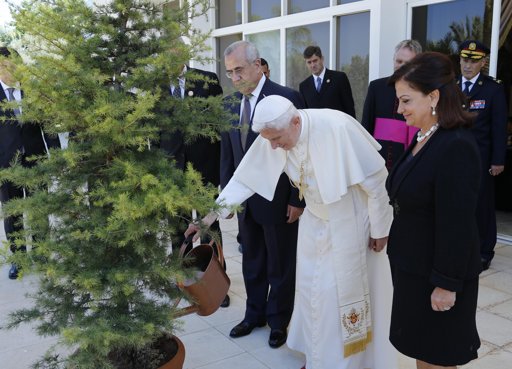
Pope Benedict XVI waters a Cedar tree as Lebanon’s President Michel Suleiman and his wife Wafaa (R) watch him at Baabda Presidential Palace near Beirut,
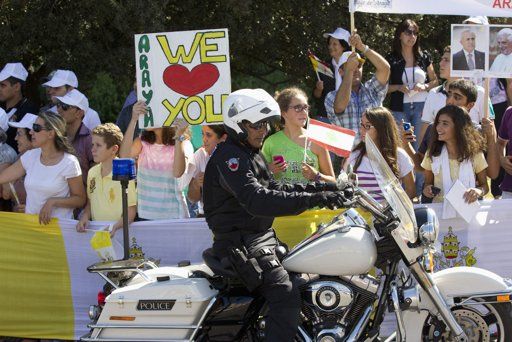

Pope Benedict XVI waves as he arrives for a meeting with youths in Bkerke in Harissa,
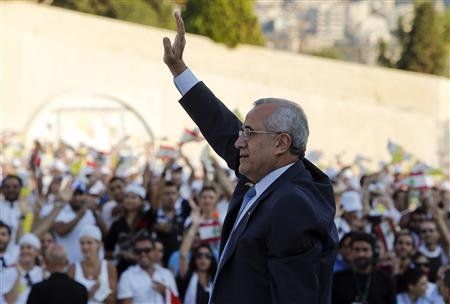
Pope Benedict XVI leaves after a ceremony at St. Paul Basilica in Harissa, Lebanon, near Beirut, on the first day of his visit to the Mideast nation. (Alessandra Tarantino, Associated Press / September 14, 2012)
Artists perform in front of Pope Benedict XVI as he arrives at Baabda presidential palace

Pope Benedict XVI greets children welcoming his arrival at Baabda Presidential Palace near Beirut, as Lebanon’s President Michel Suleiman and his wife Wafaa (R) watch September 15, 2012. Pope Benedict.
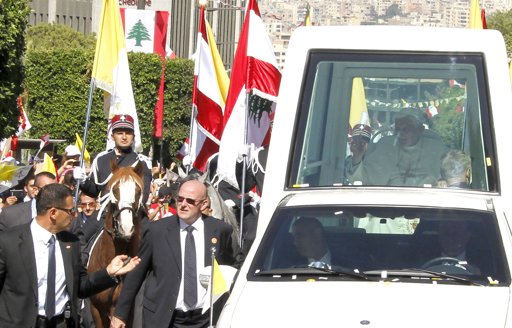
Pope Benedict XVI greets faithful from his Pope Mobile as he is surrounded by bodyguards
Bodyguards escort the Pope Benedict XVI greeting faithful from his Pope Mobile,
Faithful gather at Bkerke in Harissa near Beirut before the Pope Benedict XVI meets the
A Lebanese army soldier patrols Bkerke in Harissa near Beirut before the Pope Benedict XVI…
Reuters via Yahoo! News – 1
One can only expect that many among those who care for the Pope in his Petrine ministry have expressed their concerns for his safety given the escalation of violence in the region. However, this danger will not deter his determination to visit the region. He is a man of great courage and profound living faith. We ask our readers around the world to pray for him during this historic visit.
Lebanese Maronite Patriarch Beshara Boutros al-Rai told Vatican Radio’s Tracey McClure that the focus of this papal visit was the role of the Churches of the Middle East and how they can and must contribute to a future of peace in the region. "I think the Apostolic Exhortation is a gift of Divine providence in this difficult moment. It will present a series of challenges confronting the Christians of the region and propose some solutions and a way to proceed".
The Patriarch claimed that the Muslim community was "very enthusiastic about the Pope’s visit" and expressed his belief that "the Pope will help bring the dawn of peace to the region." And that the "real Arab Spring will arrive as the fruit of a Christian Spring and we can help to achieve this through communion and witness to love".
Pope Benedict XVI is welcomed upon his arrival at Beirut’s airport


Pope Benedict XVI attends the St. Paul basilic in Beirut


Pope Benedict XVI greets Lebanon’s President Suleiman upon his arrival at Beirut’s airpor…
Pope Benedict XVI and Lebanon’s President Suleiman review the honour guard upon his arriv…
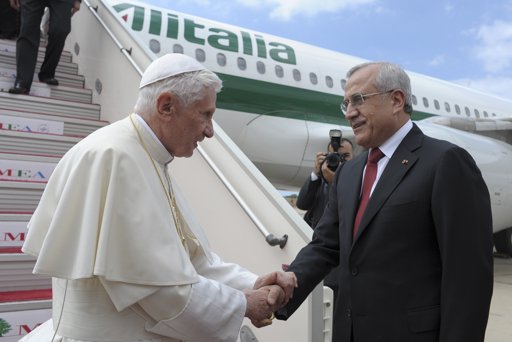
Pope Benedict XVI is welcomed by Lebanon’s President Suleiman upon his arrival at Beirut’..

Read more
Christian Copts of Egypt Claim Their Roots
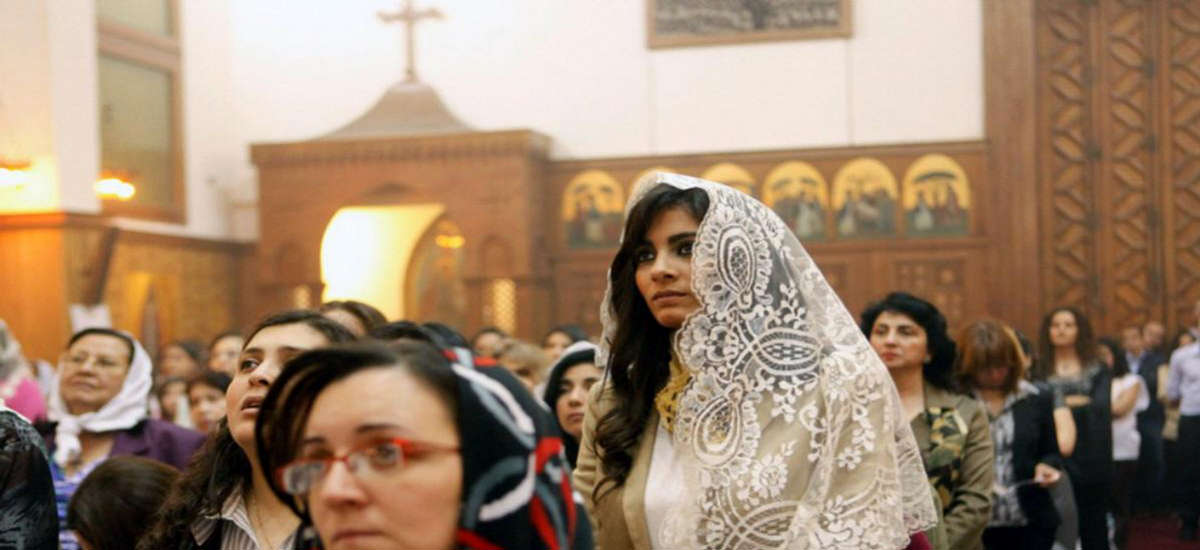
As a former tour guide on Nile cruise boats and now a professor of religious studies at Santa Clara University in California, David Pinault is no stranger to the Middle East. He was there during the demonstrations in Tahrir Square in January 2011. He recently went back again and wrote an article, "Ready To Be Martyrs." It offers us a unique perspective from which all Christians can learn.
KNOXVILLE, TN (Catholic Online) – As a former tour guide on Nile cruise boats and now a professor of religious studies at Santa Clara University in California, David Pinault is no stranger to the Middle East. He was there during the demonstrations in Tahrir Square in January 2011. He recently went back again and wrote an article, "Ready To Be Martyrs." It offers us a unique perspective from which all Christians can learn.
According to his article, two things stood out for Pinault on his most recent trip to Egypt: the modern-day martyrdom of Christians in Egypt and the Egyptian heritage of the Coptic Christian community. He recalls his driver in Cairo, a Copt by the name of Sami, telling him about the persecution of the Copts by Islamists since the demonstrations in 2011. Islamists want an Islamist government with sharia law as its foundation. But sharia law discriminates against non-Muslims and more liberal-minded Muslims.
Sami said that it had not been as bad for the Copts when President Mubarak was in power because he had suppressed the Islamists. But since Mubarak was forced to step down, the Islamists have felt emboldened. Now, they are burning churches, inciting riots against the Copts and openly calling for the expulsion of Christians without fear. As a result, over 100,000 Copts are believed to have fled Egypt since Mubarak was ousted; but Sami insisted, "I’m staying. I’m not leaving my country."
Sami added, "We’re ready to be martyrs. We’re ready to be with Christ, to live with Christ. . . . Christ is testing us. I tell my friends to stay. Christ could end this suffering, this trial, at any time. How will you feel, I tell my friends, if you’re in Canada instead of Egypt when Christ returns?" Pinault pondered Sami’s statements as they passed by the burned-out ruins of the Institute of Egypt, and he felt something stir within him.
He recalled how the institute had been founded by the French after Napoleon Bonaparte invaded Egypt in 1798. Its archives contained many ancient maps, books and manuscripts. Then in 2011 when Egyptian soldiers stood on its roof and shot at the demonstrators in the square below, some demonstrators responded by fire bombing the building to shouts of "Allah is great" and "there is no god except Allah." Much of the priceless collection was destroyed. Kamal ‘Arafah, an Egyptian poet and commentator, compared the destruction of the institute to the burning of the Library of Alexandria and the destruction of the learning centers in Baghdad by the Mongols.
Read more
Cardinal Dolan says religious freedom means leaving faith alone
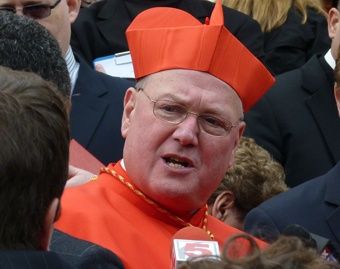
Washington D.C., Sep 13, 2012 / 04:01 am (CNA).- Religious freedom in the United States has historically been understood as allowing religion to “flourish unfettered from government intrusion,” said Cardinal Timothy M. Dolan of New York. “Simply put, government has no business interfering in the internal life of the soul, conscience, or church,” said the cardinal, who serves at the president of the U.S. Conference of Catholic Bishops.
Cardinal Dolan delivered the John Carroll Society Lecture at the Newseum in Washington, D.C. on Sept. 10. He voiced concern that “the promotion and protection of religious liberty is becoming caricatured as some narrow, hyper-defensive, far-right, self-serving cause.” “Nothing can be more inaccurate,” he said. “Rather, freedom of religion has been the driving force of almost every enlightened, un-shackling, noble cause in American history.”
Cardinal Dolan attempted to “restore the luster” of religious freedom by outlining its role throughout American history. The American Revolution itself was influenced by the Great Awakening and spurred on by ministers who encouraged participation in the fight for freedom, he observed. Churches served as “an essential partner” in the American Revolution, and freedom of religion was praised in the new nation’s foundational documents, securing “a spot in the public square for the voices of those speaking from a faith-formed conscience,” he said. In the fight against the slavery, abolitionist leaders were “mostly inspired by religious conviction,” he noted, listing prominent figures whose “devotion to the cause to end slavery flowed from a conscience formed by faith.” “In a land where loyalty to conscience and freedom of religion were not guaranteed, emancipation would have come at a much tragically later date,” he said.
Read more
Pope called upon the Christians in the Middle East t
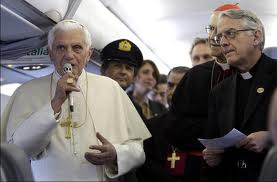
Catholic news – The Pope called upon the Christians in the Middle East to help create peace in their often troubled countries. “I exhort all Christians of the Middle East, both those born there and the newly arrived, to be builders of peace and architects of reconciliation,” said the Pope at the Vatican Sept. 12. “Let us pray to God that he may fortify the faith of Christians in Lebanon and the Middle East, and fill them with hope.”
Only 48-hours before his Apostolic Visit to Lebanon begins, Pope Benedict XVI has called upon the Christians of the Middle East to help create peace in the troubled region. “I exhort all Christians of the Middle East, both those born there and the newly arrived, to be builders of peace and architects of reconciliation,” the Pope said at the conclusion of his General Audience at the Vatican Sept. 12. “Let us pray to God that he may fortify the faith of Christians in Lebanon and the Middle East, and fill them with hope.” The Pope is making the 3-day trip to the Mediterranean state Sept. 14 – 16 to sign his Post-Synodal Apostolic Exhortation on the Church in the Middle East.
He flies into a region, though, which is still a state of often violent flux following several years of anti-government uprisings known as the “Arab Spring.” In Lebanon’s neighboring country of Syria tens of thousands of lives have been lost since an armed revolt against President Bashar al-Assad got underway in March 2011. The United Nations refugee agency estimates that nearly 250,000 Syrians have now fled to surrounding nations including Lebanon. Meanwhile in the wider Arab world, both Egypt and Libya have witnessed anti-American riots in recent days leading to the killing of the United States Ambassador to Libya, Christopher Stevens, in the city of Benghazi Sept. 11. The violent protests were sparked by the posting on YouTube of extracts of a low-budget US film mocking the Prophet Mohammed, the founder of the Islamic religion.
“The history of the Middle East teaches us the important and sometimes primordial role played by the various Christian communities in inter-religious and inter-cultural dialogue,” observed Pope Benedict.
Read more
A Message for Obama: Let Bush Be
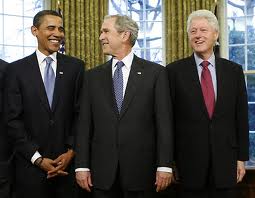
The theme of the president’s 2012 reelection campaign is that George W. Bush left such a terrible mess that Barack Obama could hardly be expected to clean it up in four years. In other words, 44 months of unemployment rates above 8 percent, $5 trillion in new borrowing, $16 trillion in aggregate debt, gas prices of nearly $4 per gallon, a dive in average family income, and involvement in two wars were all due to George Bush and simply too difficult for anyone to overcome. So Obama cannot be judged on his record between 2009 and 2012.
At first glance, this is a most unusual claim. Gerald Ford followed the mess of Richard Nixon’s Watergate scandal and the Arab oil embargo. After serving for less than three years, he failed to win reelection. His successor, Jimmy Carter, seemed to make a bad situation even worse. He exited four years later, tagged with a high “misery index” fueled by rampant unemployment and roaring inflation. Ronald Reagan took office under Carter’s baleful legacy but ran for reelection successfully in 1984 based not on “Carter did it,” but on the recovery he engineered.
Bill Clinton was elected in 1992 on “It’s the economy, stupid,” and he was reelected four years later after claiming credit for boom times. George W. Bush inherited the aftershocks of the dot-com meltdown and a country ill-equipped to respond to terrorist assaults after the nonchalance of the 1990s. Despite the 9/11 attacks, Bush was reelected on the themes of a good economy and a safer country. Blaming or praising presidents for their four years of governance is an American tradition. That is why Obama asserted at the outset that if he could not turn around the economy, his presidency would be a “one-term proposition.”
Read more
Fourteen centuries of Lebanon
William Harris, professor at the University of Otago in New Zealand and sometimes NOW Lebanon contributor, is one of the premier contemporary historians of Lebanon. Author of other highly acclaimed books on Lebanon and the Levant, his latest, Lebanon: A History, 600-2011, was published in July by Oxford University Press. NOW spoke to Professor Harris […]
Read more
Cabinet to Reconsider Salary Boost for Top Officials?
Prime Minister Najib Miqati announced readiness on Wednesday to reexamine a government decision to increase the public sector’s salaries after criticism over the boost in the wages of the country’s top three leaders, ministers and lawmakers, Information Minister Walid al-Daouq said. “Miqati said that it is possible to review the salary scale in terms of […]
Read more
